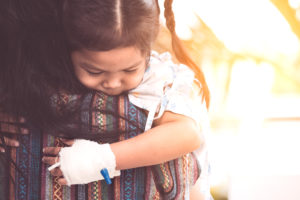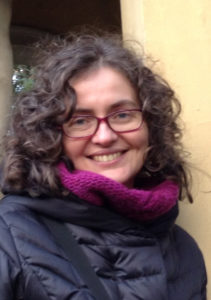
We recently had the pleasure of interviewing Dr. Ilaria Simonelli, a global educator and activist promoting family-centered care, as a basic human right. Here is what she had to say.
Please tell us about your work and your passion to help children; particularly hospitalized children.
My work as a Task Force Coordinator consists of promoting children’s rights and children’s needs at the international level through the definition of practical tools for professionals. As a Task Force, we want to orient professionals towards the views of the child. In hospitals and healthcare services this means to train professionals to communicate with children and to check that all the care and health-related information are understood by the child, according to his/her age and level of maturity. This is incredibly important. For example, if professionals can communicate with the child the experience they are about to go through and what they are going to feel during procedures like vaccinations then this will greatly improve their health in terms of stress reduction. Promoting children’s health in the healthcare sector means to make professionals realize that what is a normal event for them or for adults (e.g. vaccination), is an extraordinary and new event for the child. And as every new event, it may bring fear and worries.
The Task Force also deals with the effort to make hospital management more friendly and open to children’s views and rights. Management can be key stakeholders in providing meaningful input to professionals’ training and priorities. Personally, my passion in this field is very much related with the fact that it is not acceptable, in our times, to exclude from health processes a whole part of the population, specifically children, only because they are not able to stand up for themselves or because they have a different way of communicating and relating to people. We have the duty to empower them, respecting their views, until they become adults.
What is the greatest challenge for hospitalized children and families today?
One of the greatest challenges for parents and children today is to be able to live in the hospital as a friendly environment. Very often, hospitalization brings families to find themselves in and out of hospitals for long periods of time. This has a psychological critical impact on parents and on the child as well, especially if treatments are hard to be endured. The care dimension, related to the whole family condition, and a climate of friendliness in hospitals are so important in this respect. For example, schools in hospitals, dedicated spaces for meeting parents and peers, pet therapy, clowns, music therapy and all the elements that can help to recover a dimension of ‘normality’ and of ‘childhood’ are pivotal in terms of well-being. In Europe, we refer also to ‘Salutogenic’ buildings or architecture: how can we design or create friendlier environments to enhance well being as well? How can we change the old standards in order to improve the features of buildings (hospitals as well) and meet people’s needs? A second challenge is, of course, to share a ‘common language’ among professionals, parents, and children in order to understand each other. Creating a spirit of ‘partners in care’ is not always so easy in healthcare services.
Although the US did not ratify the UNCRC, can you tell us how you view psychosocial care as a basic human right?
Taking care of a child from a psychosocial dimension point of view is a fundamental human right. Children who cannot feel safe in society for any reason, are deprived of this right. Children who cannot have access to schools, to learning and friendship opportunities are deprived of this right. Growing up in a safe environment, having access to schools and peers, having opportunities to play, rest and leisure, being supported by societies worldwide are fundamental rights. That is why we need to develop and support interventions aiming at creating conditions of safety, self-realization and self-esteem for the child. Psychosocial protective factors help children living or restoring a normal life situation after traumatic events and for this reason they can be considered part of human rights-based intervention.
What would you like medical staff, caregivers, youth and children to know?
I would like children to know that they have rights and that as human beings they are fully entitled to them, wherever they are. I would like professionals to know that children are primary sources of information for providing good care and that these sources must be known, consulted on a regular basis and supported in expressing themselves in order to reach excellent levels of quality of health and care. I would like parents to know that they are part of a team in caring for their children and that there are professionals all over the world who are committed to working for their children’s health and rights. I would also like to invite them to consider their children as rights bearers and to involve them more and more in their own care, in case professionals still wouldn’t do it. ‘Let’s ask my daughter (or my son) if it’s okay’, that could be a good way to get professionals used to the fact that the care relationship is not dyadic, but triadic. There is a third person in the examination or hospital room and it happens to be a child: it’s not a good reason to exclude that person from the decisional process. It is a chance to learn a new way of being a healthcare professional. To re-orient policies and services so that the child’s views are fully respected is a slow process, especially in a world where obstacles are still so present and persistent, and for so many young generations. We have to be patient and don’t give up.
Please add anything else you’d like to say about yourself, your work your hopes!
I hope that the highest authorities in countries and at an international level will become more concrete in promoting and protecting children’s rights. It is not acceptable to live in a world where differences in opportunities for children are still so wide. It is not acceptable to live in a world where too often a child does not have access to schools, to a safe household, to a safe environment. I hope that one day children will be really considered by all societies as a common universal investment for the future and that for this reason they will be treated with more care and consideration. Finally, I hope the United Nations will reach a higher level of efficacy in creating concrete solutions to protect children. Their action, when it comes to this part of the population, cannot be limited by citizenship or borders. As Task Force we are honored to be able to give our contribution and work for and with children.
Click here to learn more.
 Dr. Ilaria Simonelli
Dr. Ilaria Simonelli
BSc International Relations and Diplomacy
MSc Sociology of Health
PhD in Sociology and Social Research
Unitn Research Fellow
OECD Consultant
Task Force HPH-Ca Coordinator
Freelance Consultant
